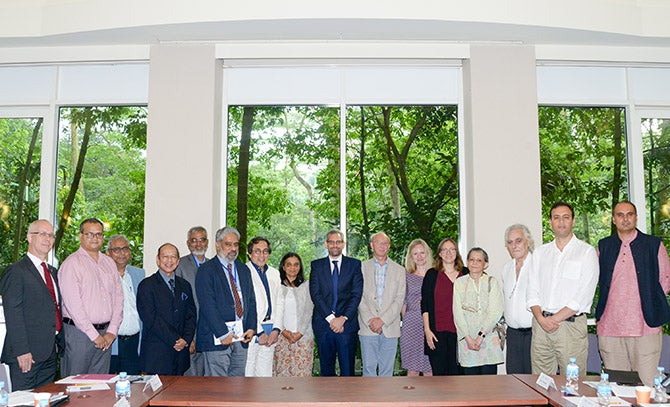
| Event Title: | ISAS-MEI Workshop |
| Topic: | Reflections on the Partition of India and Palestine after 70 years |
| Date/Time: | 15 August 2018 | 09:00 - 02:23 |
| Venue: | MEI Conference Room, Level 6, 29 Heng Mui Keng Terrace |
| Speaker/s: | Multiple Speakers |
| Description: | The “Reflections on the Partition of India and Palestine after 70 Years” workshop was a jointly organized by the Institute of South Asian Studies (ISAS), NUS and Middle East Institute (MEI), NUS. It brought together speakers from different parts of the world to analyse the partitions of British India and Mandate Palestine holistically and examine the tapestries such as the political leaderships, ideologies, laws, and institutions that connect them.
Mr Bilahari Kausikan, Chairman, MEI-NUS delivered the Welcome Remarks where he spoke about the intrinsic importance and significance of the topic to understand contemporary issues. He mentioned how “partition” is a harsh and loaded term compared to “separation”, and cited Singapore-Malaya as a successful case of “separation” whereby the two counties are not unweighted by emotional and historical baggage and complications. They get along fairly better than India-Pakistan or Israel-Palestine. In his introductory remarks, Professor C Raja Mohan, Director, ISAS-NUS highlighted the salience of partition in not only contemporary domestic politics in the Indian subcontinent but also in the inter-state relations. . He mentioned how the consequences of both India-Pakistan and Palestine-Israel partitions were so terrible and cataclysmic for the respective regions that the involved states still has not been able to come to terms and transcend their differences. He expressed the necessity for academic enterprises to make fresh enquiries into the multiple dimensions of the two partitions, and renew efforts to transcend its negativities. Next, in the Introductory Lecture titled “What is Partition?” Dr Victor Kattan defined partition as a form of statecraft that has been employed by different actors, in different contexts, at different moments, for different reasons. It is essentially a policy that leads to the division of territory to preserve order amongst great powers, often with the invocation of law in its practice. Therefore, it is not a strictly bilateral arrangement. In contrast, it is a hegemonic act of imposition by which territory is divided by a colonial, neighbouring, regional, or superpower or by a group of states acting in concert, perhaps through an international organization. He argued that while India and Palestine are the paradigm cases of partition, they were a part of a broader phenomenon Following the Introductory Lecture, the first panel discussion was on “The Partition of British India (August 1947)”. It was chaired by Dr Gyanesh Kudaisya. The first speaker was Professor Ian Talbot who re-examined the Lord Mountbatten’s Viceroyalty to address the question if the British were ‘reluctant partitionists’ and reasons that impelled them to pursue the Partition of British India. His presentation was followed by Professor Ayesha Jalal who drew on Saadat Hasan Manto’s literacies to present an intimate history of partition and its devastating consequences. She re-assessed the role and legacy of Jinnah in the partition of British India and contended that religion’s role in the partition has been overplayed by the scholars. She stressed that partition was the result of the failure to share-power between the political groups. The Question and Answer session that followed discussed the concept of multi-layered sovereignty and how partition continues to influence the people and inter-state relationships in postcolonial South Asia. The second panel was chaired by Dr Victor Kattan. It examined the Partition of Mandate Palestine (November 1947). The first panellist, Dr Penny Sinanoglou discussed how the 1937 Peel Commission report shaped conceptions of British plans to partition Palestine. The second presentation was by Dr Laura Robson on the role of the 1947 United Nations Special Committee on Palestine. The Question and Answer session that followed studied the different issues such as the domestic situation in Britain and lack of leadership in Palestine that influenced the Palestinian partition. It also addressed America’s role in the Zionist movement. The third panel discussion of the day was on “The Partitions of India and Palestine Compared”. It was chaired by Dr Iftekhar Ahmed Chowdhury and consisted of Dr Amrita Shodhan and Professor P R Kumaraswamy. While Dr Amrita Shodhan’s paper examined whether and/or how we can make sense of the connections between the two places of Mandate Palestine and British India, Professor P R Kumaraswamy expounded on India’s dilemma of pragmatism vs. principles i.e. Nehru’s preference for a partitioned India but a federal Palestine. The Question and Answer session delved into how the differences between communities were politicised and constructed as irreconcilable. It also noted that processes and outcomes of different partitions are contingent on their respective contexts and contingencies. The last panel explored the consequences of Partition for South Asia, the Middle East and beyond. The panellists for the session were Dr Iqbal Singh Sevea and Dr Mohamed-Ali Adraoui. It was chaired by Dr James M Dorsey. Dr Iqbal discussed how social identities in South Asia, particularly in Punjab, was impacted by the Partition. He explored the two rebellious figures of Punjabi folklore-Maula Jatt and Dulla Bhatti- and related them with the history and politics of Pakistan. Dr Mohamed-Ali explored the impact of the Palestinian partition on Islamist movements, particularly the Muslim Brotherhood. The Question and Answer session discussed why the Palestinian cause as a mobilising factor is so salient in transnational Islamist movements. It also raised the concept of “caste” in non-Hindu religions in the Indian sub-continent and the how colonial labelling and categorisation of different communities also moulded the latter’s identities. |
| Youtube: | https://youtu.be/MfI4xp47pAc |


